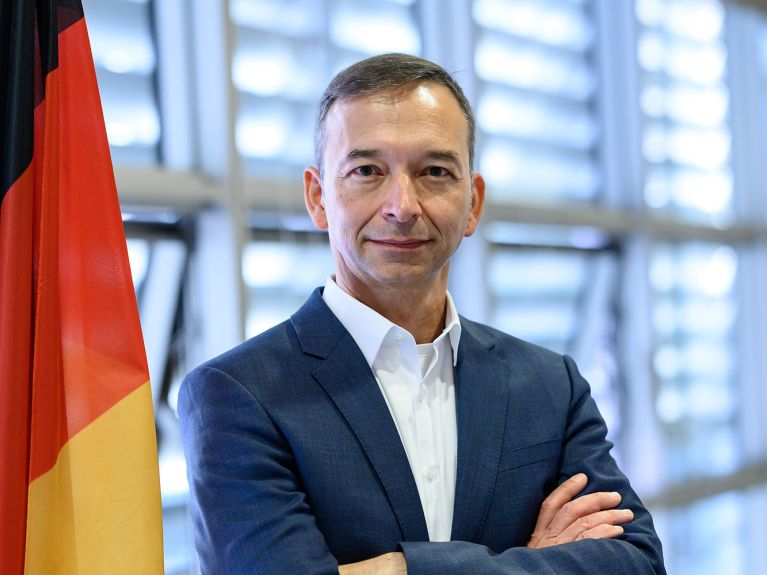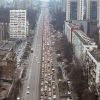“Support and solidarity”
Victim Commissioner Pascal Kober explains why it is important for society to have a national day to commemorate the victims of terrorism – this year in particular.

Since mid-January 2022, Pascal Kober has been the German government’s commissioner for persons affected by terrorist and extremist attacks committed on national territory, or the victim commissioner for short. One month later the government decided to establish a national day in Germany to commemorate the victims of terrorism, to be held on 11 March. We asked the FDP Bundestag member what the significance of such a day of commemoration is for those affected and for society as a whole.
Mr Kober, why was it important to introduce a national day of commemoration for the victims of terrorist violence?
Germany’s national day of commemoration is a follow-up to the European Remembrance Day for Victims of Terrorism, which has been celebrated every year since 2005. Terrorist attacks are targeted against us all, against our values of diversity and freedom of religion, against democracy and the rule of law. Ultimately, those affected stand for us all. The 11th of March is also to become a symbol of European cohesion. It will show that we Europeans feel a strong sense of solidarity with one another. This is why it was important to the new federal government and to me that we should establish a day of commemoration for the victims of terrorist violence in Germany, too. Many of those affected have likewise been campaigning for such a day to be introduced. In so doing, we are sending out a clear message of solidarity and paying tribute to all of those who were affected – on our behalf, as it were.
The day of commemoration will be overshadowed by the war in Ukraine. How important is such a day this year in particular?
The Russian attack on Ukraine is horrifying and has already cost many people their lives. The fact that the first commemoration day for victims of terrorist violence will be held at a time when war is being waged in Europe is a cruel reminder of just how urgently public commemoration is needed. The suffering that people are currently experiencing is impossible to imagine. A day of commemoration for terrorist victims at times such as these must remind us of the importance of our values and solidarity in our democratic society – it is not least these values that Ukrainians are fighting for.
How can such a day make people in Germany more aware of the fates suffered by the victims and their families?
A day of commemoration creates a public space for remembrance. A space that allows us to pause for a moment and commiserate. A space in which there is room for pain, grief, anger and desperation – and perhaps also for hope and optimism. A space that conveys a message: We will not forget those affected. We stand by their side. Not only after an attack, not only once a year, but every day. But I also hope that the commemoration day will raise awareness in our society of the risks to our values and our freedom, and that the population will be sensitised to the fates of the victims. Support and solidarity are important; that is particularly clear just now as we see the terrible suffering in Ukraine.
How has the state been supporting the victims so far?
On the one hand, financial support is available. Victims of terrorist and extremist crimes are entitled to so-called hardship payments as a voluntary act of state solidarity. In addition, some of Germany’s federal states have victim funds. All victims of acts of violence can also receive payments under the Crime Victims Compensation Act, such as a basic monthly pension, health and welfare benefits. The Social Compensation Law has been comprehensively reformed and will entail significant improvements for victims, though unfortunately key points will not come into force until January 2024.
Since the attack on Berlin’s Breitscheidplatz on 19 December 2016, however, many new structures and processes to help and support those affected by terrorist attacks have also been set in motion. The post of federal victim commissioner was created in 2017, for example – and made a permanent position in 2018 – and we now also have victim commissioners or central points of contact in 15 of Germany‘s states. This has proven beneficial in terms of supporting victims: after an attack, we proactively reach out to those affected and offer them assistance, working hand in hand with the state-level structures; this includes putting them in touch with those who can provide them with psychosocial, financial and practical help. Our close cooperation with victim support institutions has also proven very worthwhile.
Are then any plans that go beyond this?
Although many good things have already been set in motion, a lot still needs to be done. I believe for example that improvements are needed in terms of the way the authorities deal with victims, and as regards the hurdles that those affected face when applying for compensation and other support services. I am optimistic that the system of case management that will be incorporated into Germany’s Social Compensation Law from 2024 will help. My goal is to find out even more about how those affected view the process so that this knowledge can be used to improve the situation for them.
Fighting extremism and terrorism is one of the German government’s central objectives. Which in your view are the key issues that need to be addressed?
Prevention and proper work by the security agencies are important pillars. As a society, we must do everything we can to consistently fight racism, violence and discrimination every day, to draw attention and sensitise ourselves to it, and to strengthen cohesion in our society. We will not forget the victims of these appalling attacks.


